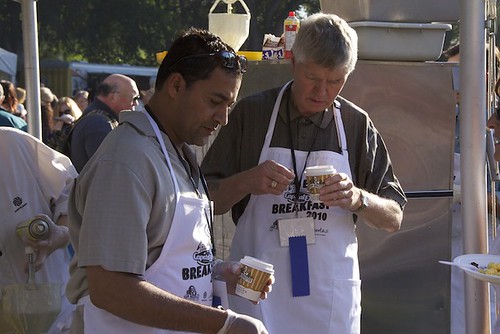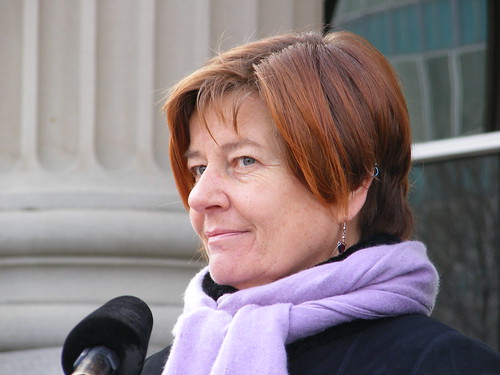By: Richard Liebrecht
Going into the election, the two-person caucus of Brian Mason and Rachel Notley was well known among media insiders and observers for punching above their weight in earning coverage. Having served as communications officer for the caucus, I like to think I also played a small part in that excellent coverage. You get it by being relevant and timely.

But relevancy and timeliness weren’t required this past election. New Democrats got solid coverage everyday. As did the Liberals, PCs and Wildrose. When I say solid, as a professional public relations practitioner (read: flack), I mean uncritical, straight-up recording of events and releases. I know that some press releases were literally re-written into stories and published.
Early in the campaign, the New Democrats sent Mason into a sports store to buy an Oilers jersey. Five cameras showed up just to get tape. It was way too easy.
Had it not been for a blogger talking about conscience rights and the Wildrose, and a P.C.-connected tweeter highlighting gay-damning comments from a Wildrose candidate, the election may have been nothing but a bunch of rehashed press releases and horserace stories.
I’m not here to slam reporters, however. I count many as friends, and I formerly worked for the Edmonton Sun.
Perhaps that’s why the slack coverage of the election is in my mind easily explained – this election was the product of a dwindling media presence in this province. It’s a national and international trend that’s seeing the reporting industry shrink while economies and populations are at historically large sizes.

Firstly, newsrooms were under resourced this election. The Wildrose at times had only one reporter aboard their mammary motor coach, despite their surge in the polls. The reporters who may have been assigned to it were instead covering multiple campaigns in a day because there just weren’t enough bodies to put someone full time with each campaign.
I know that reporters had found Hunsperber’s blog, but didn’t have time to look through it extensively enough to find the trouble posting.
Secondly, editors are desperate to cover every bit of news available. Sounds good, but thanks to short staffing, they’ve been forced to choose: do original work and let some news slip by, or throw all your resources into making sure you have all the news that’s everyone else is doing. Their choice is evident when several cameras showing up for a guy buying a hockey jersey. Every station was worried they may not have the shot. And God help that editor if they tweet a picture of it 30 minutes later than another outlet. This is the blowfish act of outlets too proud to show that there’s little meat left on the bones.

It’s scary to think that Hunsperger’s blog may not have come to light before Election Day. Premier Smith would have had damage control to do, no doubt – but also no one to answer to for four years. The tidal wave of strategic voting may never have been triggered. Who knows what else media missed?
While a shrivelled press corps makes getting out my story as a PR flack easier, as a citizen I know that’s a dangerous state. While truth can be relative, it is relatively objective. I hope and expect media will be out there wading through the facts and opinions with genuine, untainted curiosity to expose lies and half-truths. Media, at its best, is a bulwark of accountability. When that accountability dwindles, then so too does the warning of punishment for spinning half-truths and even lies, as some dishonourable members of my profession do. Corruption and confusion come unheralded and unstoppable.
None of this is inevitable in a growth society. As news consumers, we have two important choices to make. We can decide to reward enterprising journalism with our readership, or continue to loyally follow a shrunken media into irrelevance. We can decide to pay for subscriptions to good journalism, or we can continue to live under the illusion that news is free.
Demand news with insightful analysis, interesting human perspectives, exploration of new angles and lots of background research. And pay for it.
While handfuls of journalists will continue to lose their jobs if media continues to whither, it’s you who next election may unwittingly vote for someone or something you didn’t even know you were voting for.
Richard Liebrecht (@wardofcanada) is a public relations specialist. He’s formerly communications officer for Alberta’s NDP opposition, where he consulted on communication strategy. He’s also a former staff reporter at the Edmonton Sun. He blogs at wardofcanada.blogspot.com.






